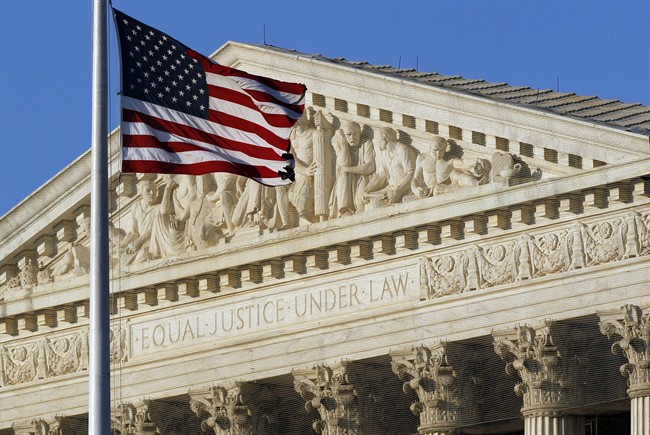President-elect Donald Trump made plenty of campaign promises during his run for the White House.

Build a wall along the border with Mexico. Halt the entry of Muslims into the United States. Rip up the North American Free Trade Agreement.
Many of these proposals could run up against opposition in Congress or budgetary issues. But Trump’s promise to appoint conservative justices to the U.S. Supreme Court is one voters can expect to see come to fruition fairly quickly, and without many hurdles.
Here’s a rundown of what a Trump presidency means for America’s most powerful judicial body.
Why does the new president matter for the U.S. Supreme Court?
The sitting president typically appoints justices with similar ideological views to his own. In Trump’s case, that means socially conservative, right-leaning lawmakers.
READ MORE: No rise in support for gay marriage after Supreme Court ruling
The nine sitting American Supreme Court justices are appointed for life, unless they step down voluntarily, retire or are impeached (that’s never happened). Justice Oliver Wendell Holmes was the oldest judge ever to serve, and he was 90 when he stepped down.
The U.S. Senate must confirm the president’s choices, but given that Republicans have retained control of both houses of Congress, it is unlikely Trump’s picks would be blocked.
How many justices could Trump appoint?
That depends on how many leave the court during his tenure in the White House, but there is already one empty seat to be filled.
The sudden death of conservative Antonin Scalia last winter prompted President Barack Obama to nominate Washington. D.C., judge Merrick Garland to fill the vacancy.
WATCH: Obama nominates Merrick Garland to the Supreme Court

But the Senate has blocked that move, and Trump will therefore be free to nominate his own, more right-leaning pick as soon he takes office.
Age is on Trump’s side. Two justices, Anthony Kennedy and Ruth Bader Ginsburg, are now in their 80s. Either one could retire (or even pass away) during his tenure, freeing additional seats. Justice Stephen Breyer, meanwhile, is 78.
So how might the court change?
Trump’s first pick for the court will already tilt the balance back in favour of the conservative camp. Kennedy is the longest-serving justice, and he tends to split his decisions between the left and the right. He has sided with the more liberal judges on decisions like the recent legalization of gay marriage.
If he, Ginsburg or Breyer (both of whom are left-leaning) were to leave the court before 2020, Trump would in all likelihood replace them with yet more conservatives, further tilting the balance in favour of the right.
“I think it’s disastrous for any liberal aspirations in terms of how the court will deal with issues of reproductive rights (or) affirmative action, going forward,” said University of Ottawa law professor and U.S. constitutional law expert Carissima Mathen.
What will this mean for the average American?
Trump has already predicted that America’s seminal abortion ruling, Roe v. Wade, will be overturned during his administration. That could affect a woman’s right to access a legal abortion in the United States.
“If we put another two or perhaps three justices, that will happen,” Trump said during the third presidential debate. “That will happen automatically, in my opinion, because I am putting pro-life justices on the court.”
WATCH: Donald Trump pressed to clarify his position on abortion

According to Mathen, there must first be a challenge to the law.
“You’d need to have a state that would legislate in clear violation of Roe v. Wade, so just make abortion per se illegal, and have that go up,” Mathen explained.
Once the case reaches the highest court in the land, even right-leaning justices might be reluctant to contravene a doctrine known as “Stare Decisis,” or “let the decision stand.”
“Is the court prepared to overrule itself? One of the features of precedent, especially with a high court, is that you don’t overrule a past decision just because you think it’s wrong,” Mathen said.
“But could Roe v. Wade be up for grabs? I think it could.”
A more right-leaning court could also deal a blow to affirmative action laws and campaign finance laws, Mathen confirmed. And yes, gun laws could be affected, too.
One of Trump’s central campaign planks was the protection and preservation of the right to bear arms.
A 2008 Supreme Court ruling reaffirmed that the U.S. Constitution protects the right to bear arms, but that decision has not been used for much yet — except to invalidate outright handgun bans.
Trump has repeatedly said that he would seek to bolster the Second Amendment, citing judicial appointments as a way of accomplishing that goal.
A lot could depend on whether the older justices will outlast Trump, Mathen noted. If they do, the court may remain split, with Kennedy remaining the deciding vote in favour of more liberal rulings.




Comments